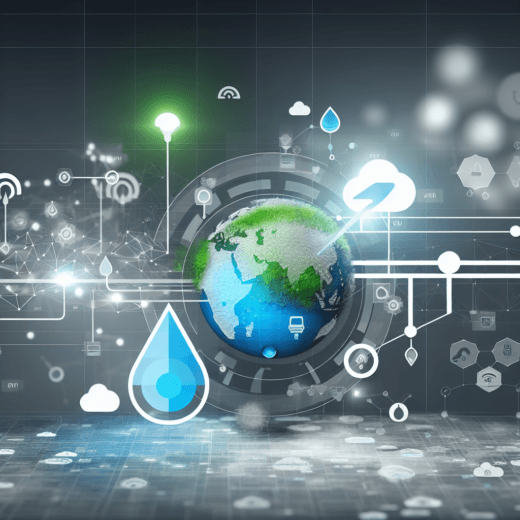Introduction
In the evolving landscape of technology and sustainability, smart water management has emerged as a crucial innovation, especially within the real estate sector. With the global population’s exponential growth and an increasing emphasis on sustainable practices, the demand for efficient water management solutions is more pressing than ever. The integration of IoT (Internet of Things) technology into water management systems offers a promising approach to address these challenges, presenting opportunities for startups to innovate and disrupt traditional markets.
Understanding Smart Water Management
Smart water management leverages IoT technology, sensors, data analytics, and artificial intelligence to monitor, manage, and conserve water use efficiently. The approach aims not only to optimize water usage but also to enhance the overall management of water resources across residential, commercial, and industrial properties. By integrating smart technologies, real estate stakeholders can achieve better water efficiency, reduce costs, and contribute to environmental sustainability.
The Innovation Potential of Smart Water Management
Developing IoT-based water conservation systems introduces a new paradigm in the real estate industry. It involves deploying a network of internet-enabled devices capable of collecting and transmitting data about water consumption patterns, leakages, and system performance in real-time. This real-time data empowers property managers and owners with actionable insights to address inefficiencies and reduce waste. Furthermore, smart water management systems can integrate with other building management systems, creating a more holistic view of a property’s infrastructure.
Market Disruption
The implementation of IoT in water management signifies a radical shift from traditional methods, often characterized by manual operations and inefficient resource allocation. By offering granular insights into water usage and wastage, IoT systems can drastically reduce operational costs, improve infrastructure lifespan, and enhance user satisfaction. This technology disrupts established water management models, potentially displacing companies reliant on outdated methodologies while providing startups with a competitive edge.
Key Challenges in IoT-Based Water Management
Despite the promising outlook, there are significant challenges that startups must navigate when venturing into IoT-based water management. Data security and privacy issues arise as these systems collect sensitive consumption information. Ensuring robust cybersecurity measures is paramount to gaining user trust and complying with regulations. Additionally, the integration of IoT devices with legacy systems in older properties can be complex and costly.
Opportunities for Startups
The market for IoT-based water management presents diverse opportunities for startups. Early-stage companies can focus on niche segments such as residential properties, commercial buildings, or industrial facilities, tailoring their solutions to meet specific needs. Opportunities also exist in providing consulting services for existing real estate entities looking to integrate smart water solutions seamlessly. Moreover, startups can explore partnerships with established entities in the construction and utilities sectors, leveraging their networks to expand market reach.
Fundraising and Scaling Strategies
Startups in the smart water management arena must adopt a strategic approach to fundraising and scaling their businesses. To attract investors, highlighting sustainable and economic benefits is crucial. Demonstrating a clear path to profitability through detailed financial projections can enhance investor confidence. Furthermore, startups should consider strategic partnerships with industry players to accelerate growth and facilitate market expansion.
Achieving Product-Market Fit
Attaining product-market fit is essential for any startup’s success. This involves understanding the unique needs of target customers, whether they are property developers, facility managers, or homeowners. Conducting extensive market research to identify pain points within current water management practices allows startups to tailor their solutions effectively. Feedback loops, pilot programs, and iterative product development are instrumental in refining offerings to meet market demands.
Customer Acquisition Strategies
Effective customer acquisition is a cornerstone of building a sustainable business. Developing a comprehensive marketing strategy that encompasses both digital and traditional channels can enhance visibility and brand recognition. In addition, leveraging word-of-mouth and case study testimonials from satisfied customers can be a powerful tool for attracting new clients. Engaging with industry events, trade shows, and real estate conferences provides further opportunities for networking and establishing brand authority.
Unique Business Models and Technologies
Startups can adopt innovative business models to differentiate themselves in the competitive landscape. For instance, offering subscription-based services allows customers to access advanced analytics and maintenance support on a recurring basis. This model not only provides predictable revenue streams but also fosters long-term client relationships. Additionally, integrating blockchain technology can enhance transparency and traceability in water usage, addressing consumer concerns about data reliability and integrity.
Real-World Case Studies
Several startups have successfully navigated the challenges and opportunities in the smart water management space. For instance, a company named Utilis has utilized satellite technology to detect leaks in municipal water systems, significantly reducing water loss and operational costs. Another startup, AquaSeca, designed acoustic sensors that monitor water flow and identify leaks in residential and commercial buildings. These examples underscore the potential for innovation and sustainable impact that IoT-based water management solutions offer.
Academic Research and Industry Reports
The field of smart water management is supported by extensive academic research and industry reports that validate the efficacy and benefits of IoT technologies. Research highlights the potential for significant water savings, reduced environmental impact, and cost efficiencies. Industry reports also project substantial market growth in the coming years, driven by increased urbanization, climate change concerns, and regulatory pressures for sustainable water use.
Conclusion
Smart water management systems represent a transformative opportunity for startups aiming to impact the real estate sector positively. By harnessing IoT technology, entrepreneurs can introduce innovative solutions that promote sustainability, reduce costs, and enhance resource management. Although challenges exist, they are surmountable with strategic planning, robust technology development, and effective market engagement. As the demand for sustainable solutions continues to grow, startups in this space are well-positioned to lead the charge towards a more efficient and environmentally conscious future.

